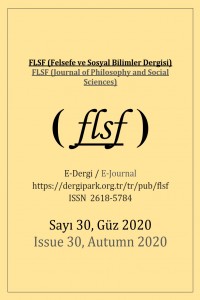Abstract
Analytic philosophy made a metaphysical turn after mid 20th century and metaphysics/ontology became one of the important, main areas of analytic philosophy. This metaphysical turn started with an critical approach to some of the main themes of classical philosophy (for example, universals, substance etc.) and still goes on with contemporary debates. In these debates the place of the ontological status of objects became one of the leading issues.
In this paper we reveal the Eliminative and Non-Reductive approaches mainly and then refute the arguments of Eliminative approaches and defend Non-Reductivism. This examination was made by the discussions about the Special Composition Problem. As a conclusion of this paper, it was revealed that the object is composed of its parts but formed as a new, non-reductive individual.
References
- Baker Lynne Rudder, A Metaphysics of Everyday Life, Cambridge: Cambridge University Press, 2007.
- Baker Lynne Rudder, “A Metaphysics of Ordinary Things and Why We Need It”, Philosophy, 83, 2008, pp. 5-24,
- Denkel Arda, Nesne ve Doğası, İstanbul: Doruk Yayımcılık, 2003.
- J. L. Austin, Sense and Sensibilia: Reconstructed from the Manuscript Notes by C.J. Warnock, Oxford: Oxford University Press, 1962.
- Loux Michael J., Metaphysics: a contemporary introduction, New York: Routledge, 2006.
- Lowe E. J., “How Are Ordinary Objects Possible?”, The Monist, vol.88, no.4, pp. 510-533.
- Markosian Ned, “Brutal Composition”, Philosophical Studies: An International Journal for Philosophy in the Analytic Tradition, Vol. 92, No. 3, 1998, pp. 211-249.
- Merricks Trenton, Objects and Persons, New York: Oxford University Press, 2001.
- Thomasson Amie L., Ordinary Objects, Oxford: Oxford University Press, 2007.
- Unger Peter, “There Are No Ordinary Things”, Synthese, Vol. 41, No. 2 (Jun., 1979), s. 117-154.
- Van Inwagen Peter, Material Beings, New York: Cornell University Press, 1990.
- İnternet Kaynakları: Korman Daniel Z., “Ordinary Objects”, (Çevrimiçi) SEP, ed.: E. N. Zalta, http://plato.stanford.edu/archives/win2011/entries/ordinary-objects/, 17 Haziran 2020.
Abstract
Analitik Felsefe 20. yy’ın ikinci yarısından itibaren bir dönüşüm yaşamış ve günümüzde klasik metafiziğin bazı konularını (örneğin tümeller, töz vb.) gündemine almıştır. Güncel ontoloji tartışmaları içerisinde de nesnelerin yeri önemli bir tartışma başlığı olmuştur.
Bu çalışmada analitik ontolojideki nesne tartışmalarında iki karşıt görüş olan Saf Dışı Bırakıcı Görüşler ve İndirgemeci Olmayan Görüşler incelenecek ve İndirgenemezcilik lehine argümanlar ortaya konacaktır. Nesne tartışmaları içindeyse özellikle tek bir başlık üzerinde durulacaktır: Özel bileşim sorunu. İlgili sorunun ve olası cevapların incelenmesiyle bileşim durumlarında bir nesnenin oluşması ve neden oluşturucularına indirgenemez yeni bir varolan olarak ortaya çıktığı üzerinde durulacaktır. Bu sayede her türden nesnenin bireyselliğinin olduğunu savunmanın yolları ve bu savununun bir ontoloji ortaya koymaya olan katkıları sergilenebilecektir.
References
- Baker Lynne Rudder, A Metaphysics of Everyday Life, Cambridge: Cambridge University Press, 2007.
- Baker Lynne Rudder, “A Metaphysics of Ordinary Things and Why We Need It”, Philosophy, 83, 2008, pp. 5-24,
- Denkel Arda, Nesne ve Doğası, İstanbul: Doruk Yayımcılık, 2003.
- J. L. Austin, Sense and Sensibilia: Reconstructed from the Manuscript Notes by C.J. Warnock, Oxford: Oxford University Press, 1962.
- Loux Michael J., Metaphysics: a contemporary introduction, New York: Routledge, 2006.
- Lowe E. J., “How Are Ordinary Objects Possible?”, The Monist, vol.88, no.4, pp. 510-533.
- Markosian Ned, “Brutal Composition”, Philosophical Studies: An International Journal for Philosophy in the Analytic Tradition, Vol. 92, No. 3, 1998, pp. 211-249.
- Merricks Trenton, Objects and Persons, New York: Oxford University Press, 2001.
- Thomasson Amie L., Ordinary Objects, Oxford: Oxford University Press, 2007.
- Unger Peter, “There Are No Ordinary Things”, Synthese, Vol. 41, No. 2 (Jun., 1979), s. 117-154.
- Van Inwagen Peter, Material Beings, New York: Cornell University Press, 1990.
- İnternet Kaynakları: Korman Daniel Z., “Ordinary Objects”, (Çevrimiçi) SEP, ed.: E. N. Zalta, http://plato.stanford.edu/archives/win2011/entries/ordinary-objects/, 17 Haziran 2020.
Details
| Primary Language | Turkish |
|---|---|
| Subjects | Philosophy |
| Journal Section | Articles |
| Authors | |
| Publication Date | December 10, 2020 |
| Submission Date | September 8, 2020 |
| Acceptance Date | November 1, 2020 |
| Published in Issue | Year 2020 Issue: 30 |
Starting from 2024, our journal will be published in 3 issues as two regular and one special issues. These issues will be published In May (regular issue), September (special issue) and December (regular issue).
Acceptance of articles for our special issue and our regular issue in December will begin on March 15.
Only articles within the scope of the file will be included in our special issue.
Thank you for your attention.


